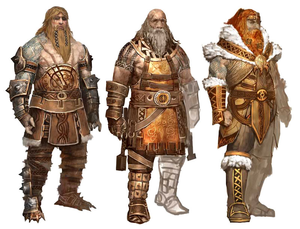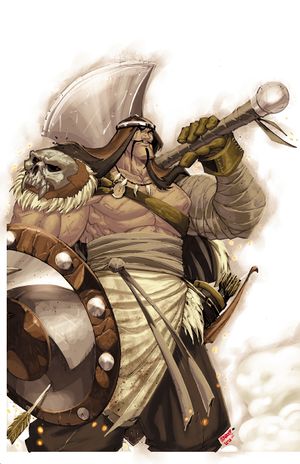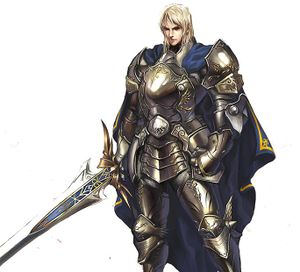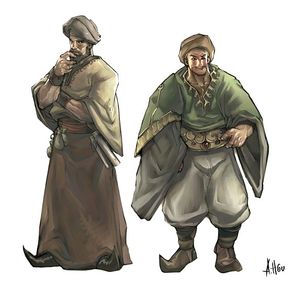Difference between revisions of "Humans"
| Line 1: | Line 1: | ||
| − | <center> |
+ | <center>{{wide image|humans06.jpg|550px|alt=The many faces of humanity.}}</center> |
Revision as of 00:55, 28 May 2010
Called The Younger Children, or Children of Second Age, humanity has now come into its own, staking near ownership over most of the known world despite being on the low end of the scale of power in comparison to a polytheistic world of demons, gods, angels, giants and dragons. Regardless of this, humanities abilities to adapt to survival in nearly any location, their drive to expand and evolve and their hardy creative natures enable them to survive and compete in a world much larger then they are. There are some who say the recent events of The Movement of the World have brought about the impending end of the age of humanity, but one thing is certain, and that is that the champions of humanity will not allow them to fade quietly from the stage of history.
By and large the humans of the world of Gaea are what you would expect them to be like given the fantasy setting. As a race, they are diverse and numerous. Many of the larger cultures of humans have recently begun to embrace the rise of technology through the power of Artifice and development of steamwork and clockwork technology in its wake. Thus, humans are among the leading races in terms of technological advancement and scientific achievement as a result. Other more mighty races often underestimate humans but no other race has influenced history or achieved the highest heights of kingdom building or the lowest depths of corruption as humanity. Overall there is a sense of hardiness and bravery that seeps through the entire race and enables them to rise up in times of great trial and adversity. Although every human culture differs from each other, there are basic common traits that all possess.
Human Lands
Human culture was born in the southern reaches of the continent of Vantyre in days prior to the growth of the Dune Seas. Cerenza, one of their first major civilizations, grew rapidly in size through exploration, trade and commerce and monuments to their ancient culture still stands to this day in south western Veyshan where remnants of their phaoronic dynasties still rule. Humans spread across the bulk of The Great Continent in the aftermath of the Time of Glaciers, disrupting the efforts of other older races as they grew in number. Eventually a large bulk of them settled along the western coast and in the north. Humans have ultimately broken up into dozens of different cultures and nationalities. However, of these there are several that stand out very prominently and adequately represent the rest.
When choosing to play a human, it is important to carefully consider your nationality and culture. Further in this document you will see the different cultures that an individual can hail from. It is important for humans to consider these cultures because unlike other races, there is no singular cultural identity that unites all humans. For example, the humans from Dran are known for their great stature and physical strength. They are rugged and barbaric as well as mighty warriors who often work as mercenary armies in distant lands. By contrast, the Nation of Selentia, a member of the Myrddion High Kingdom, is also known as The Land of a Thousand Princes. The humans here pride themselves on high society with high levels of cultural taste and the finer more silken aspects of life. They are swashbucklers, rogues and poets. The culture you choose for your human will help color his background, accent, appearance, and goals. For these purposes, humans are actually split into their different cultural entries with the differences in abilities and capabilities reflected therein. Please see
Religion
The entire pantheon of Gaea is available to humanity and in truth they have shaped most of the global belief systems where the gods are relevant. It is among humanity that the individual gods find their most faithful allies and staunchest foes.
Human Cultural Groups
Humanity is perhaps the most diverse of the enlightened races in terms of the variations that exist. The below information represents the most common of the cultural variations that exist. Most of our human cultures have real world and historical equivalents in order to give you a basis to work from when determining the particular nuances about your characters and various cultural quirks that space here does not allow us to delve into. You are encouraged to use this information to color your characters backgrounds and your daily roleplay.
Acanian: Acanians are the dominant culture of humanity that emerged from the collapse of the Millennium Kingdom and spread throughout the continental regions of Arcania and Estamir. They are sometimes referred to, in Arcania at least, as Common Men for they can be found throughout the Holy Kingdom of the Lion, in Alexandros, in Rune, the mountains of Khazad Duin, deeps of Charn and in the numerous unnamed duchies, small kingdoms and oligarchies in The Vast and Eastern Thresholds. They can even be found in Dran or in The Desolation as outlaws and bandits. They are the smiths, the bakers, the jewelers, the merchants, the courtiers and artisans and the engineers and architects of the world. Physically speaking they run the full gauntlet, typically influenced the most by their geographical location and sometimes intermixing with more pure blooded cultures that dwell as their neighbors and that exist on the fringe of society. They can be pale or bronze skinned, lanky or powerfully built, usually dark haired but not always and more then any other culture of humanity shows the variation that can occur from the mixing of families and the varying relationships and alliances that occur amongst the sons of men.
Aesir: Sailors, bodyguards, mercenaries, warrior kings and occasional raiders and ravagers, the Aesir share some similarities with their distant cousins, the Dranei, nearly approaching the Dranei in size and competitive with them in strength. As sailors they are unmatched, even by the southern sailors of Cerenza, and when disciplined into organized armed forces such as those held by the nation of Stormgarde, few can match their determination focus upon the battlefield. The Aesir are largely isolated in the northern reaches of the world in distant Stormgarde and beyond. In Stormgarde itself their culture has left the days of ancient barbarism and pillaging behind and formed a martialocracy society of warrior kings and druidic advisors. Further north in Wintergarde, these lands are dominated by shamanistic groupings of Aesir known as Skalds, who maintain close watch over the forests and glacier ridden fields of the High North, even to the distant Icewall Mountains where remnants of Maugrim the Tyrant-God's forces still hold sway. Though the days of them raiding the southern warmer lands are long gone Aesir still eagerly pass beyond the Steps of Ymir into the Myrrish lands and beyond and there they are found as proud noble warriors who maintain the traditions of their northern ancestors. High instances of lycanthropy abound among them and many a legend includes variants on worship of aspects of Caracoroth the great wolf god or Angoron as the Beast King.
Cerenzan: Dark skinned, proud cheekbones, dark haired, noble and sometimes arrogant, the Cerenzans of today are the descendants of those who founded one of the earliest and mightiest civilizations of men, who even today maintain some of the worlds oldest monuments to their greatness. The ancient Cerenzans created systems of mathematics, astronomy, architecture, politics and religious rites that are still in use by numerous cultures to this day. Though Cerenza, today, is but a pale fraction of its former glory, it thrives in south western Veyshan and along the Islands of Jade where they dwell as traders, merchants and sorcerers of some renown. In these coastal regions their skin ranges from deep brown to red, and they are sailors of considerable skill. As a people they favor colorful bright clothing, dressing with sashes, robes and garments that reflect their homelands of deep southern heat. Their ancient past has also bred a degree of arrogance in many of them especially when compared to the histories of their northern brethren, but they have yet to embrace the industrialization that is sweeping other areas of the Great Continent. Instead they prefer to keep their use of artifice to a minimum while relying more on their ancient arts and traditions to sustain their life style.
Dranei: The seven true tribes of Dran are known as The Dranei. A race of towering humans who dwell in the rugged land of Dran, sharing the region with giants, orcs and other monstrous humanoids and yet thriving as the dominant race there regardless. Dranei have produced warlords of staggering power and mercenary champions of nearly uncontrollable strength. Their mercenary armies have fought in wars all across the known world and the nation heavily promotes acts of warfare, strength, brutality more. They are the consummate barbarian people, being the first image that comes to the mind of many when they think of such individuals. The Dran draw their strength from a mighty bloodline influenced by giantish blood and centuries of warfare and natural selection in the harsher northern lands of the continent. As such many consider them paragons of physical condition and strength whose capabilities far exceed that of most normal men. They are hardier, stronger and tougher then common men but lack in other areas such as versatility and flexibility to different ways of thinking.
Eldanar: The Eldanar are also known as the Highborn and are descendants of a once powerful people who had great amounts of celestial bloodline and power within them. Their legends, abilities and activities have placed them in the forefront of many historical documents regarding the history of the continent of Arcania. As a culture, the Highborn are no longer truly unified but instead exist as scattered families in the various human kingdoms of the west. In kingdoms such as Myrddion, Highborn are often found in the positions of lords, knights, soldiers, members of the church or the devoted servants to another lord. They are rarely in common ordinary positions and often find themselves compelled to contribute to the common welfare of whatever part of society they are from. They are by and large a good people although the depravity of the Civilization of Machines and Sorcery and founding and current leadership in Charn shows that even they fall and are not incorruptible. Their hair is often dark with variations of reddish gold, sandy brown and true blond occurring. They are typically fair skinned but some sport ruddy appearances or olive tinted skin. Their eyes are often grey, green or blue. Long lived, Highborn live a lifespan approaching that of the average half-elf but mature at the same rate as the average human. Highborn are mostly concentrated in and around the Myrrish kingdoms, which is to say the lands united under the banner of the Holy Kingdom of Myrddion. They have no true kingdom of their own and instead operate as scattered remnants and households in service of nobles and lords. In the furthest east and south, in Charn's domain, Highborn can also be found and here the roles are reversed. Ruling houses and nobility operate within the Charn aristocracy as tyrants for Charn was founded by exile Highborn from the West lands. It is unusual for Highborn to originate in lands other then these. Highborn are excellent riders, capable of mastering any steed and stories abound of their champions riding exotic mounts and taming beasts of incredible power. They favor heavy armor and are comfortable fighting with swords and shields. Today the Highborn cavalry is still strong and in use in places like Myrddion where they supplement the efforts of foot soldiers with their skill.
Phurai Dae: Phurai Dae, sometimes called the Plains People and The Horse Lords, maintain a culture of nomadic life style deep in the heart of the great plains known as The Vast. Life among the shifting plains and planar-happenings of The Vast ranges between joyous and harsh. Battered in the past by magical upheavals and great arcane warfarers, The Vast is known for the weak walls that separate it from The Far Realms and The Unseen. Strange creatures of chaos take shape here and wander the world, races from realms far beyond mortal understanding attempt to make their way across it and in some places time itself may slow, flow backwards or stop all together. Despite these hardships and those presented by more natural forces be it monstrous raids or simple politicking between the nomadic tribes and cultural groupings; The Phurai Dae thrives. They are a joyous people. Tall, weathered brown by the elements, colorful and showy. Quick to laugh and boast and thunderous in their anger. Their simple ways and life belie a complexity to their matriarchal society, which is one of the few examples of a true democracy in a world of kings, queens and empires. They are friendly to other races though can become very superstitious at times to over abundant displays of magic or even the heavy use of arcane technology. The Phurai Dae are one of the few who have, as a tradition, truly mapped the planar chaos that afflicts the heart of The Vast, making order and sense out of the chaos and thus knowing how to chart their travels.
Tsurans: Tsurans are another human culture that share the great plains of The Vast with the Phurai Dae. The Tsurans, olive skinned dancers and mysterious gypsies, can mostly be found in communities and settlements ruled over by established princes or in wandering caravans known as The Faring Folk, that plunder the mysteries of the great plains and the weak planar walls that plague The Vast. Their loose perception of personal properties and their tendencies towards the flamboyant have earned the Tsuran an interesting reputation among other cultures and it is a reputation that they often use to their advantage. They are lovers of games of chance and many a sharp-witted Rogue, Bard or even Wizard sometimes comes from Tsuran stock. They take well to the art of illusion making and they bind this well into their revelries which can last well into the latest hours of the night and early hours of the morning. Their flexibility and eccentric natures do not make it hard for young Tsurans who leave the bands and princedoms to find work out in the wide world beyond. Even in the Vast they often find themselves working alongside the Phurai Dae as guides, outriders and rangers exploring the great mystery of the plains.
Veyshanti: The people of the vast sub-continental sized region of Veyshan are collectively known as The Veyshanti. From their elaborate head wrappings, elaborate robes to help protect from the searing winds of the desert, leather and light armor, skin shades of mahogany and brown, uses of the curved scimitar, the Veyshanti are somewhat distinguishable and they stand out compared to other cultures in the world. Dwellers of the Deep South, The Veyshanti are divided into two cultural groups. Those who dwell among the Dune Seas and those who thrive among the mercantile courts and princes of the Golden Coast. All together they are considered Veyshanti although they have vastly different cultural beliefs and outlooks. The tribes of the Dune Seas have wandered the growing desert for as long as any can remember, singing hymns to the moon and the stars and the goddess of law and justice. By contrast, the people of the Golden Coasts are exuberant, colorful, flamboyant and overwhelming to the point of decadence among its rich and influential and the differences between the rich and poor here are stark and as wide as the chasms of the Rift Seas. Slavery is common here, arcane magic is used in an overabundance and the blood of the ancient djinns runs through the veins of the ruling class.
Xian: The mysterious Xian are comprised of a multiplicities of ethnicities that itself only represents a fraction of the legendary realms and exotic domains that lie beyond the Roof of the World. Islands of Jade and Tsang Lun are themselves the result of ancient colonial offshoots of these further distant realms and have taken on identities of their own due to their trade and intermingling with nations and cultures of the north and west. Dusky skin and almond shaped brown eyes are common traits of the majority of the Xian, the Hin, who ruled by their Azure Empress, dominate much of the island chains that make up Tsang Lun. As a people they are prosperous and traditional, quiet and polite and not prone to outbursts of anger but rather seething quietness when they are insulted. Though seemingly reserved they are renowned as artisans, crafters and colorful users of cloth and magic to work visual wonders that dot their numerous gardens, pagodas and temples to their variations of the gods. Numerous monkly traditions have found their way into western lands, spurred on by their various philosophical approaches and strong animistic traditions.
Humans in the Pathfinder Campaign
The Pathfinder Campaign for Emblem of Ea opens up with humanity besieged on all sides. There are some who believe that the golden age of men is coming to an end and that they have failed as stewards of the world. The ascension of the dark goddess has triggered numerous events that have pushed the nations of men nearly to the brink. Years of constant warfare has taken its toll on the Myrrish Kingdoms and civil unrest grows over contention over the throne of the High King. The tireless efforts of the deathless dragon known as Heth, and his raised legions of the soulless slaves of the once sunken nation of Ur, besiege the western world without end in sight. In the far north, the returned Witch King amasses his forces behind the Icewall Mountains while the war engines of Dran stir with more aggression and apocalyptic strength then ever before. The very landscape of the world of men has been altered by earthquake and tsunami and magical upheaval and the ability to be unified has been compromised. The sudden restoration of the former Alexandros region and lifting of the curse of the mists offers some reprieve to the dark years. Humans who are the victim of fallen nations without kings or leaders flock to the restored industrialized city state, causing it to rapidly swell in size and become a new beacon of hope in turbulent times.
Human Racial Traits
| Name | Base Height | Base Weight | Modifier | Weight Multiplier |
| Human, male* | 4ft 10in | 120 lbs | +2d10 | x2d4 lbs |
| Human, female* | 4ft 5in | 85 lbs | +2d10 | x2d4 lbs |
- +2 to One Ability Score: Human characters get a +2 bonus to one ability score of their choice at creation to represent their varied nature.
- Medium: Humans are Medium creatures and have no bonuses or penalties due to their size.
- Normal Speed: Humans have a base speed of 30 feet.
- Bonus Feat: Humans select one extra feat at 1st level.
- Cultural Trait: All humans must select a culture of origin. For more detailed information about the nine major cultural groupings of humanity please see further below.
- Acanian Common men who can rise up and overcome despite great adversity and the power wielded by their oppressors is a common theme for Acanians. They receive a +2 racial bonus to all saves involving fear as well as a +2 racial bonus to Diplomacy.
- Aesir Northern warriors and wanderers of the ice wastes, the powerful Aesir receive +2 racial bonus to intimidation and a +4 racial bonus to resist cold related conditions.
- Cerenzan Founders of ancient traditions of math, science and principles of civilization, the Cerenzan are a cerebral people and receive a +2 racial bonus on knowledge (Arcana, Engineering, History, Religion) checks..
- Dranei Dran produces stalwart individuals with legendary levels of strength and endurance. They receive a +2 racial bonus to intimidation and a +4 racial bonus on fortitude checks to resist Fatigue and Exhaustion.
- Eldanar The Eldanar are leaders among humanity and possess powerful souls. They receive a +2 racial bonus to diplomacy and checks and a +2 racial bonus to saves against death effects, energy drain and ability drain attacks.
- Phurai Dae Legendary horse lords and nomads of the Great Plains, Phurai Dae receive a +4 bonus racial bonus to ride checks involving horses and a +2 racial bonus to handle animal. They may use their full ride bonus on animals not suited for riding.
- Tsuran Performers and tricksters at heart, Tsurans receive a +2 racial bonus to Bluff, Sleight of Hand and Diplomacy checks.
- Veyshanti Hardy desert merchants and children of djinn and elemental kings, the Veyshanti deal with their elemental driven environments well. They receive a +4 racial bonus on fortitude checks to resist heat related conditions and a +2 racial bonus to appraise.
- Xian Artists, merchants and traders from the Utter East, the Xian receive a +2 racial bonus to Appraise, Diplomacy and Bluff.
- Skilled: Humans gain an additional skill rank at first level and one additional rank whenever they gain a level.
- Languages: Humans begin play speaking Common. Humans with high Intelligence scores can choose any languages they want (except secret languages, such as Druidic).



